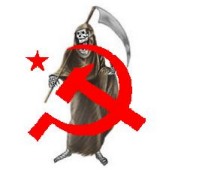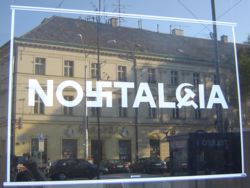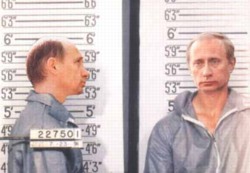We are developing the social individualist meta-context for the future. From the very serious to the extremely frivolous... lets see what is on the mind of the Samizdata people.
Samizdata, derived from Samizdat /n. - a system of clandestine publication of banned literature in the USSR [Russ.,= self-publishing house]
|
Over at the excellent libertarian group weblog, Cattalarchy, there is a fine and thoughtful collection of articles, which was published a few days ago, to mark the May Day parades of old socialists with a wide-ranging broadside against what communism has wrought. I urge folk to fire up some coffee and take time out to read them all.
With all that fine material in mind, I was stunned to read a screed in the latest edition of The Spectator by ultra-rightwinger Peter Hitchens. As well as saying some decidedly uncomplimentary things about former South African President and anti-apartheid campaigner Nelson Mandela, a topic to which I may return later, Hitchens also bemoans what he claims has been the lack of any real improvement of life in countries which have been released from communism.
Really? Have there been no improvements at all? I mean, for a start, surely a declared Christian like Hitchens should be glad that fellow believers are no longer persecuted as they were in the old days of Communism. The Gulag is no longer in operation. Members of the KGB no longer drag you off in the middle of the night. And yes, key parts of the economies of those nations are not just recovering, but offering some of the tastiest investment opportunities in the world today, as this article illustrates.
There is a priceless passage in which Hitchens even refers to the elderly generation in the former Eastern bloc who miss the good old days of guaranteed jobs, even if that era came with bread queues, bureaucracy and compulsory military service. That’s the spirit! None of this messy and vulgar capitalist nonsense, with all that bothersome choice, and ugly advertising, noisy department stores and red light districts.
I honestly do not know what to make of folk like Hitchens and whether he has any coherent political philosophy at all apart from a desire to shock what he thinks is the received wisdom (not always a bad or dishonourable urge, mind). A few weeks back he wrote a superb article shredding the case for state identity cards, of the kind that any libertarian would be proud to write. Yet a few issues later we get a gloomy piece almost pining the days when half of Europe was run by the communist empire of the Soviets.
Weird.
Notwithstanding the result of the Spanish election that David so poignantly blogged about yesterday, one thing that the commentators note is the turnout. Apparently, the extra 3 million voters who turned out to vote were spurred by the terrorist attacks and disgruntled by the Aznar government’s handling of the information in the aftermath. It transpires that the popular opinion in Spain was against supporting the US in the conflict with Iraq and the country’s participation in the ‘Coalition of the Willing’.
The BBC commentators have a field day – the ‘power of democracy’ has been demonstrated and the Spanish voters have chosen a socialist government. It don’t get better than that. It is a dream come true.
Oh, wait. The Russians have elected its President. In an extraordinary and widely predicted result, the former KGB agent crushed his closest rivals by securing 70 per cent plus of the vote, according to preliminary exit polls:
Russians overwhelmingly turned their backs on western-style democracy yesterday, voting for stability and a strong hand at the helm by giving four more years in office to President Vladimir Putin.
Although there was a small chance of under 50 per cent turn out, the Russians were forcefully encouraged to exercise their democratic rights, or else:
Officials are trying to bolster interest with patriotic advertisements showing Soviet-era rockets blasting off and glossy pictures of model Siberian mines. Others exhort parents to vote for the sake of their children.
Some officials have used bribes, threats and other schemes. Last week hospitals in the far eastern city of Khabarovsk put up notices saying they would refuse to treat patients who could not prove they had registered to vote in hospital.
So in one country we have a socialist government taking over as a result of democratic elections that were influenced by terrorist attack whose horror is still fresh in the people’s mind. In another, an overt authoritarian has cemented his already powerful position for another four years. I doubt very much that either election was determined by anything resembling rational discourse. No, I am not naive and do not expect every single voting decision to be rational or even sensible, however, the events of yesterday point to the other extreme.
[Retiring back to his cave, mumbling something about “emotionally incontinent” times…]
Sometimes when I feel the need to see the world through very strange eyes indeed, I wander over to the Pravda website for a bit of paleo-collectivism using language little different from Soviet days. I am rarely disappointed.
There is a splendid example of entertaining pretzel logic in slightly fractured English called West against Russia. The article discusses that the fact many articles appear in the western media which are critical, unflattering and disparaging regarding modern Russia and particularly Vladimir Putin. The author of the article, Mikhail Chernov makes it clear that the western reports are not just reportage but are a campaign and ‘Russian experts’ know why this is happening:
The main task of the new media campaign is making Vladimir Putin (who will probably be elected for the second term) not legitimate in the minds of Western audience. Meanwhile, some Russian experts believe that toughening the position of the West did not result from Russian political events and certain economic interests in Russia. The EU and the USA increased their criticism of Russia because of the crisis of the “Western” model of social order and simultaneously express their rejecting Russian social order model in this way.
So western criticism actually has nothing much to do with Russia, it is just a facet of the crisis of our social order, hence…
Many Russian experts believe that moving Western politics into anti-Russian direction is inevitable. Director of Pamir-Ural research group Alexander Sobyanin said that there is no special plan to undermine Russia. Western elites do not think bad about Russia and are not going to bring Russia down.
Quite so, there is not much interest in ‘bring Russia down’ anywhere other than Chechnya. In truth, western elites (whatever that means) do not really tend to think overmuch about Russia at all. But the fact Russia is seen as a far of basket case by most western elites is not the thrust of the article at all. Quite the contrary in fact.
According to Mr. Sobyanin, sharp increase of anti-Russian propaganda resulted from the crisis of the Western society elites. “The elites of only three countries were in the mainstream of the global economic and social development in the last century – Russia, the USA and Great Britain. The world entered the stage of changing dimensions – it has to abandon outdate absolute “financial criteria” and elaborate the new paradigm of development. Implementing changes will be accompanied by wars and social conflicts. Anglo-Saxon elites are not ready for this yet”, said Alexander Sobyanin. He believes that there is a chance that Russia can elaborate new, alternative algorithm for global development (in last century it was socialism), and for this reason the West perceives Russia as the dangerous ideological competitor.
Well I did tell you that I go to Pravda because I enjoy reading things that are surreal. This appears to say the thing that is wrong with the Anglo-Saxon model is that it looks at the ecomony in economic terms! And so what is this ‘new paradigm of development’? It is not spelled out so let me guess: economics must be managed politically for fairness and efficiency in order to avoid ‘wasteful competition’? I am just speculating here but who feels brave enough to disagree and tell me this is not at the root of this ‘new paradigm of development’ being hinted at? The notion that Russia is a source of a viable economic algorithm likely to challenge ‘Anglo-Saxon’ capitalism is quixotic to put it politely… laughable to be a bit more blunt.
As Russian civil society exists only precariously, the Russian social model is simply that of subordinating ‘social’ interactions to politically regulated interactions strongly influenced from the top. In short, the Russian social model is ‘people being told what to do’. The socialist ‘ownership’ based method of doing that has simply been replaced with the more effective fascist style ‘control’ based method. Which is to say, rather that nationalising everything, the Russian state simply regulates things and imposes controls on what people can do with what they nominally own.
This is of course also the approach of regulatory statists even in Britain, the USA and elsewhere in the west, but unlike those places, Russia has the ‘advantage’ of a civil society with no significant intermediate organisations between it and the state, moreover it is a society conditioned to a top down approach by centuries of Tsarist autocracy followed by Communist totalitarianism. The article then goes on to talk about how in the ‘Anglo-Saxon’ way, it is competition which defines our civilisation:
Western model” implies having certain “agreement” accepted by the society. One of the backbones of this agreement is competition between individuals. Russian tradition does not recognize competition as positive factor because competition awakes low instincts in people and does not improve the quality of products, but, on the contrary, worsens their quality.
Which no doubt explains the huge flood of high quality Russian products sweeping the world. That pesky toleration of individualism will be the undoing of us poor Anglo-Saxons. In reality, that there are any successful businesses at all in Russia is testament to the ingenuity of individual Russians and their ability to operate in spite of the ‘Russian model’.
Quite apart from the fact this utter tosh claims to be ‘reasoned analysis’, the fact that the people who think of themselves as Russia’s elites still think in such delusional terms shows the extent to which things have not yet recovered intellectually from that nation’s poisonous past. Who needs The Onion when you have Pravda? Sorry, but there is only one kind of Russian model that has any interest for the rest of the world.
Via the constantly diverting Dave Barry comes news of the state of the popular arts in Russia.
You know those nesting dolls they have there. Putin on the outside. Undo him and you get the Fat Drunk Guy, undo him and you get Splotchtop, then another Fat Drunk Guy, then Andropov, then Brezhnev, and so on down the list of the Soviet Hall of Shame. This could all be in the wrong order and I could well have left out a couple of Drunk Guys, but you get my drift. Those dolls, is what I mean. Well, now they have nesting dolls with rock star faces on them.
The really cunning one would be a set of different Elvises, starting on the outside with Very Fat Elvis just before he died, and working back via Las Vegas Elvis, GI Elvis, to Original Elvis. But I do not think they have yet got around to doing that.
Nevertheless, I love it. Says it all. Think who the dolls used to be, and now look at them. Another triumph for capitalism.
Wired reports that Russia has successfully tested a hypersonic anti-Star Wars weapon capable of penetrating any prospective missile shield, a senior general said Thursday. The prototype weapon proved it could maneuver so quickly as to make “any missile defense useless,” Col.-Gen. Yuri Baluyevsky, the first deputy chief of the General Staff of the Russian armed forces, told a news conference.
This exchange of statements has an air of nostalgia about it:
Putin said that the development of new weapons was not directed against the United States, and Baluyevsky reaffirmed the statement, saying that the experiment shouldn’t be seen as Russia’s response to U.S. missile defense plans. “The experiment conducted by us must not be interpreted as a warning to the Americans not to build their missile defense because we designed this thing.”
In Washington, Gen. Richard Myers, chairman of the Joint Chiefs of Staff, was asked by reporters about the Putin statement. “If you’re in that business — intercontinental ballistic missiles and warheads — you want them to be survivable, and maneuverability is one way to increase their survivability against any potential defenses.”
I suppose the signs of new era are the following bits:
Putin said that Russia has no intention of immediately deploying new weapons based on the experimental vehicle. “We have demonstrated our capability, but we have no intention of building this craft tomorrow.”
Baluyevsky said that Russia had informed the United States about its intention to conduct the experiment and added that U.S. officials issued no objections.
We shall see.
I found this gruesome story in a letter to Editor in today’s Telegraph:
Sir – Julius Strauss’s report on the lost prisoners of the Soviet gulag (News, Jan 3) reminded me of a wartime experience.
As an 18-year-old seaman aboard an escort destroyer out of Scapa Flow in 1943-44, I recall that, after shepherding the convoy in the Kola inlet north of Murmansk, we moved to the small dockside at Polyarni.
During one of our arrivals, when some of us were stretching our legs ashore, a well thrown snowball caused me to stagger against a snow-covered stack of logs. I recovered my balance to find that I was hanging on to a human foot, naked and frozen.
We found that the stack was not of timber, but of human bodies, laid five upon five, approximately 30 to a stack, piled along the jetty. We surmised that they were casualties of the war to the south, could not be buried in the frozen ground and had been moved by rail to an ice-free port for disposal at sea.
Having read your report, I am inclined to suggest that they had perished in the gulag Vorkuta, not far to the east.
From:
Leslie James Cousins, Petersfield, Hants
The article mentioned in the letter talks of horrendous conditions of gulag prisoners at the Vorkuta camps.
Even in the context of the times, the suffering at the Vorkuta camps was extreme. In the winter, temperatures on the tundra can drop to minus 50C.
Inmates were provided with ill-fitting, poor quality clothes and forced to work 12 or 14 hours a day on a starvation ration. During the 1940s and 1950s a million prisoners passed through the Vorkuta gulags, according to Memorial.
At least 100,000, perhaps many more, died. They were buried in the rock-hard permafrost or simply left by the roadside to be covered by snow.
Many of the survivors are now trapped by poverty as the hyperinflation following the end of communism wiped out their meagre savings. For years Vorkuta was a political gulag. Today it has become an economic gulag.

The scale of Russia’s disillusionment with western-style democracy became apparent yesterday as the country’s two largest pro-western parties were all but wiped out in parliamentary elections.
President Putin’s United Russia came out the clear winner with 37 percent of the vote and a majority in the new State Duma and will most likely end up controlling two thirds of the Duma enabling the president to change the constitution at will. This may not be a revolutionary change from the past as the constitution was rendered feeble and Duma castrated by Yeltsin. Another quarter of the seats will be shared by anti-western reactionaries nostalgic for the days of Soviet superpower status.
The election made clear one thing – that I have argued here on Samizdata.net in the face of indignation by some commenters – Russia is not (and was not) heading the right direction. The reasons for this are more fundamental than Putin’s taste for power or Yeltsin’s penchant for gestures of a ‘Leader of Mother Russia’. Although they both fossilised what was wrong with the political and state institutions in Russia, their attitudes and actions originated from the country’s political and social values and traditions and were often supported by the majority.
Here are some quotes that sum up the political development in Russia:
Yesterday’s election shows what the people actually think: they are stridently nationalist, want wealth redistributed and have little interest in liberal or democratic values.
An analyst at a financial firm, Aton
It is a sad day for liberalism. The liberals in Russia are finished in the short term.
Igor Mintusov a political campaign consultant at Nikkolo M
Our main impression of the overall electoral process was one of regression in the democratisation of this country.
Bruce George of the Organisation for Security and Co-operation in Europe
The first two statements are spot on, the last one confuses democracy with liberal values. The Russian elections were probably democratic alright. It is freedom, liberal constitutionalism, individual and civil rights that have suffered a defeat in Russia. My point is that they were not even taking part.
Look, matey, I know a dead protocol when I see one, and I’m looking at one right now:
Russia says it will not ratify in its present form the Kyoto Protocol designed to mitigate global warming.
“The Kyoto protocol places significant limitations on the economic growth of Russia,” presidential aide Andrei Illarionov told a conference in Milan.
The landmark environmental pact cannot now enter into legal force, especially since the US has also repudiated it.
It’s not pinin’! It’s passed on! This protocol is no more! It has ceased to be! It’s expired and gone to meet it’s maker! It’s a stiff! Bereft of life, it rests in peace! If you hadn’t nailed it to the perch it’d be pushing up the daisies! It’s metabolic processes are now ‘istory! It’s off the twig! It’s kicked the bucket, it’s shuffled off it’s mortal coil, run down the curtain and joined the bleedin’ choir invisibile!! THIS IS AN EX-PROTOCOL!!
Some ‘amazing’ news from Russia – President Vladimir Putin has met with the country’s richest business people and warned them that unless they share their wealth they risk losing it. He told them they must use their wealth to help reduce poverty, saying there is a line between wealth and political power. Seems like an offer they can’t refuse…
Sounds familiar? You bet. Putin used to be the head of KGB and I expect no less of him. His career since the fall of communism did nothing more than reinforce his old communist opinions and prejudices. It is possible that his ‘talking to’ to the 800 businesses could be, just could be, a very clever PR ruse to appeal to the Russian people who have to struggle to make the ends meet in a whole new and ‘free’ post-communist fashion whilst the nouveau rich flaunt their wealth. But I do not really think so. It is worse than that, he actually believes it. The few politicians from the former communist bloc who are perceived as ‘englightened’ by the West are more often then not paleo-communists whose rhetoric has turned communitarian, or outright anti-capitalist. This is what Putin told a packed Hall of Columns in the House of Unions that included at least five billionaires:
[Businesses] must aim their efforts at developing a system of new social guarantees for the population in line with the new demands of the time. [We must join] forces to make the lives of people economically sound so that they have plenty to live on.
Bye-bye the lip-service to individual property rights whilst economic future of Russia circles round the drain as her dozen billionaires and several thousand millionaires have begun the process of moving their money off shore. God speed, ‘comrades’.
I am sure that these ‘gentlemen’ are no lambs. In fact, I am certain that their money does not come from honest business. Most likely they grew obscenely rich on rigged privatisations – they happened to be at the right place, right time, with nastier thugs at their command. From what I have seen so far it seems to me that Mikhail Khodorkovsky might not of the same ilk but I do not know enough about him to stand by that conclusion.
Nevertheless, the way to tame the ‘oligarchs’, as they are affectionately known in Russia, is not making them hand-over their money. Just make them subject to the same laws as everyone else (I hope it is obvious that Yukos is not Russia’s Enron). That would, however, require strong institutions such as courts and legislature upholding laws in general and contracts between individuals in particular. This is profoundly lacking in Russia and elsewhere in Eastern Europe.
The Russian state machine is toxic. It may have divested itself of the evil ideology, but it continues to trample over the individual. Rights and justice are considered Western luxuries or, better yet, a clever propaganda by the Western politicians to mask the strings pulled by the military-industrial complexes. Tinfoil hat material? I do not think so – not enough tinfoil in Russia for the lot of them.


According to our good friend Iain Murray, the Russians have really put the boot to cherished theories at the World Climate Conference.
According to Iain, the head of the Russian Academy of Scientists said the only effect of dropping Kyoto “would be on several thousand people who make a living attending conferences on global warming”.
An urgent memo to the people whose job it is to monitor so-called ‘greenhouse gases’: there appears to be more than enough hot air over Central Europe to keep the Kyoto balloon aloft:
Russia came under pressure from the European Union at the weekend to ratify the Kyoto protocol on greenhouse gases, amid fears that Moscow’s commitment may be wavering.
Yes it is probably ‘wavering’ because the Russians (in common with everybody else) know that the Kyoto Protocol is a bad idea which has been touted as the solution to a non-problem. If the Russians have got any sense they will consign the whole boondoggle to the shredder.
The protocol, which is backed by the EU but opposed by Washington, needs the support of the Russians to reach the threshold of backing required for it to come into force. Although Moscow announced last September that it would ratify, it has so far failed to do so, raising fears that the entire international effort to combat climate change could be stalled.
The keyword here is ‘fear’. Not fear of environmental catastrophes or other such fantastic nonsense, but a (justified) fear among Europe’s political elite that their dirigiste economies will not be able to compete in a truly global marketplace.
Altero Matteoli, the Italian Environment Minister, called for enhanced cooperation with the US and Russia, as well as with emerging economies,such as India and China.
‘Cooperation’ is a euphamism for ‘submission’ and what Mr.Matteoli and his ilk require is for potential competitors to hobble themselves with pointless and damaging regulatory burdens that slap a lid on industrial and technological development. The only other method of halting decline is root-and-branch reform of the Europe’s stagnating economies and that is not going to happen.
Kyoto is not about ‘saving the Earth’ or ‘improving the quality of life’ or any other enviro-mentalist nostrums. Kyoto is a deeply dishonest contrivance; a device for propping up an arcane and protectionist ‘old’ Europe.
Asks b3ta.com:
Men: Like looking at pretty ladies? Like laughing at bad translations of Russian mobile phone conferences? You’re in the land of luck as this site combines both.
It certainly does. Eldar Murtazin is impressed, and Andreas Von Horn (that’s what it says) translates:
Year by year, visiting CeBIT, catch myself at idea, that they have better organization, and exhibits for the first time are shown exactly at this exhibition, instead of wandering on the world, turning in an antiquity. But there is one big advantage of the Russian exhibitions and of SvyazExpocomm as one of the most appreciable, there are excessive plenty of beautiful girls on one square meter of the area. The last year one my foreign friend after visiting the exhibition has left in prostration and has told, that knows where to look for a wife. Girls in city centre which caused the genuine interest and remarks in the excellent form, have simply ceased to exist. The friend all the rest three days has spent at the exhibition, and according to him has not been sorry at all about it.
On results of the first day has collected about 500 photos of girls from various stands, a part from them we’ll publish in this picture story. I can not give up to myself such pleasure, and the reputation needs to be supported, in fact the tradition began the last year. To try listing all photos is senseless, further are photos that have appeared by will of case beside and have pleased me.
For knowing people and visiting the exhibition not the first year, CBOSS name talks a lot about, but I beg to assume, that in the last turn about billing. However, judge, I in my turn dream to shake hands with the person, which selects girls for this company!
Ah, those wacky foreigners.
 
|
Who Are We? The Samizdata people are a bunch of sinister and heavily armed globalist illuminati who seek to infect the entire world with the values of personal liberty and several property. Amongst our many crimes is a sense of humour and the intermittent use of British spelling.
We are also a varied group made up of social individualists, classical liberals, whigs, libertarians, extropians, futurists, ‘Porcupines’, Karl Popper fetishists, recovering neo-conservatives, crazed Ayn Rand worshipers, over-caffeinated Virginia Postrel devotees, witty Frédéric Bastiat wannabes, cypherpunks, minarchists, kritarchists and wild-eyed anarcho-capitalists from Britain, North America, Australia and Europe.
|










